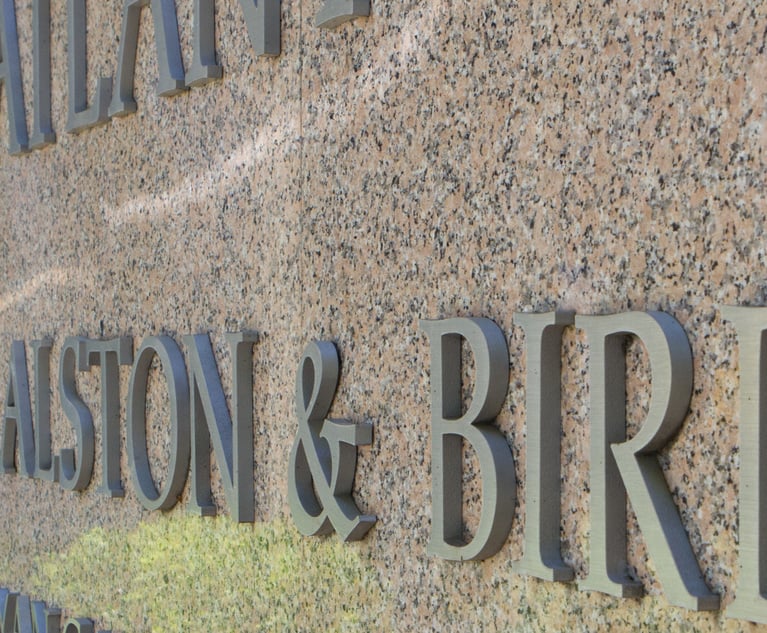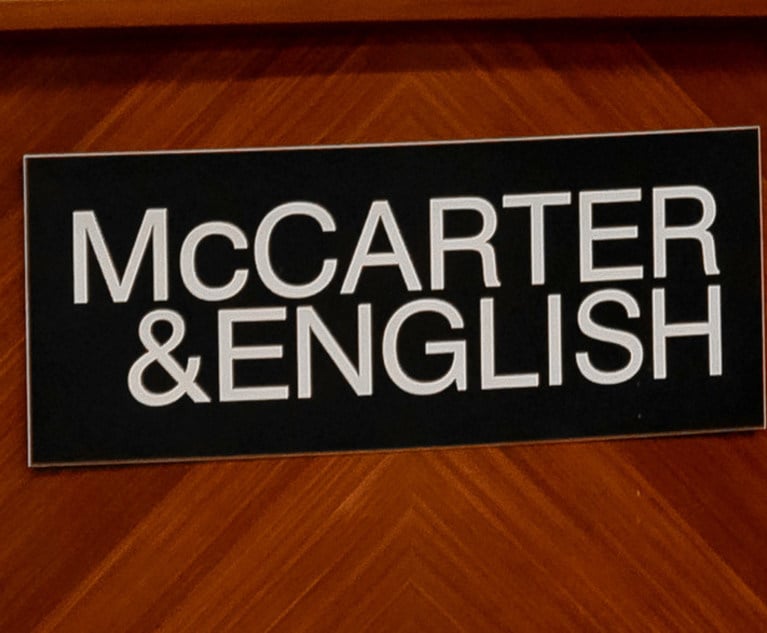Proskauer Looks to Ditch Still-Pending Stanford Ponzi Suit
Ahead of an upcoming Dallas trial, Proskauer's defense team filed a notice on Thursday with the U.S. Court of Appeals for the Fifth Circuit as part of an effort to escape claims from an official committee of investors who lost money in R. Allen Stanford's massive, long-running Ponzi scheme.
April 20, 2018 at 03:50 PM
4 minute read
 R. Allen Stanford, who was chairman of Stanford Financial Group, arrives at the Bob Casey Federal Courthouse in Houston for a hearing in 2010. (photo by F. Carter Smith/Bloomberg) |
R. Allen Stanford, who was chairman of Stanford Financial Group, arrives at the Bob Casey Federal Courthouse in Houston for a hearing in 2010. (photo by F. Carter Smith/Bloomberg) |
Defense lawyers for Proskauer Rose have lodged a late-stage request for a federal appeals court to shut down a case accusing the firm and a former partner of helping R. Allen Stanford to conceal his massive Ponzi scheme from regulators.
Ahead of an upcoming Dallas trial, Proskauer, through its defense team at Davis Polk & Wardwell, filed a notice on Thursday with the U.S. Court of Appeals for the Fifth Circuit as part of an effort to escape claims from an official committee of investors in Stanford Financial Group—a collection of companies that Allen Stanford used to perpetrate a years-long, $7 billion fraud that landed him in prison on a 110-year sentence.
The Official Stanford Investors Committee, or OSIC, has accused Proskauer and former partner Thomas Sjoblom, who worked at the firm from 2006 to 2009, of helping Stanford avoid regulatory scrutiny amidst his scheme. The appeal, which challenges an April 10 decision from U.S. District Judge David Godbey in Dallas that denied the firm's motion for judgment on the pleadings, comes less than two weeks before a trial is scheduled to begin on April 30.
Proskauer has been arguing since at least May 2016 that it should be shielded from the suit under the attorney immunity doctrine. Specifically, the firm maintains that the investor committee was never a client of the firm's or of Sjoblom's and that Proskauer should be immune from claims by non-clients under a Fifth Circuit ruling that arose out of another Stanford case.
“Courts applying Texas law have repeatedly rejected non-clients' attempts to assert claims that were purportedly assigned from clients because allowing non-clients to bring such suits would prevent attorneys from zealously representing their clients,” Proskauer's defense team wrote in a May 12, 2016, motion for judgment on the pleadings.
But on April 10, Godbey sided with the investors, holding that the investor committee—which was court-appointed in 2010 to represent the interests of people who held certificates of deposit or other investments with Stanford Financial—does have standing to pursue Proskauer in the suit.
“OSIC—which is assisting the [Stanford] receiver with prosecution of these claims pursuant to the court-approved agreement between both parties to jointly prosecute such claims[—]has standing as both an unincorporated association and as a representative of the Stanford investors,” the judge wrote on April 10. Godbey also allowed the investor committee to amend its complaint and kept Proskauer in the case as a defendant.
That decision is what Proskauer is now challenging at the Fifth Circuit. As of Friday, the firm had filed only a notice of appeal, as opposed to a substantive brief.
Davis Polk's head of litigation, James Rouhandeh, serves as Proskauer's lead defense counsel. He did not immediately respond on Friday to a request for comment, nor did Strasburger & Price's David Kitner, the lead lawyer for the investors. Castillo Snyder also represents the plaintiffs.
The investor committee's claims against Proskauer are part of broader private litigation that arose from Stanford's fraud. Previously, Chadbourne & Parke—where Sjoblom practiced between 2002 and 2006, before he joined Proskauer for a three-year stint—paid $35 million to settle claims that had been brought against it. Hunton & Williams also settled a Stanford-related suit, agreeing in September 2017 to pay $34 million.
Sjoblom, who now has his own securities litigation and criminal defense firm, was also named a defendant in the investor committee case, but the two sides reached an agreement in late 2016 to dismiss those claims. He was represented in the Stanford litigation by Dentons.
This content has been archived. It is available through our partners, LexisNexis® and Bloomberg Law.
To view this content, please continue to their sites.
Not a Lexis Subscriber?
Subscribe Now
Not a Bloomberg Law Subscriber?
Subscribe Now
NOT FOR REPRINT
© 2024 ALM Global, LLC, All Rights Reserved. Request academic re-use from www.copyright.com. All other uses, submit a request to [email protected]. For more information visit Asset & Logo Licensing.
You Might Like
View All

Former McCarter & English Associate Fired Over 'Gangsta Rap' LinkedIn Post Sues Over Discrimination, Retaliation
6 minute read

Kirkland to Covington: 2024's International Chart Toppers and Award Winners
5 minute readTrending Stories
- 1'Largest Retail Data Breach in History'? Hot Topic and Affiliated Brands Sued for Alleged Failure to Prevent Data Breach Linked to Snowflake Software
- 2Former President of New York State Bar, and the New York Bar Foundation, Dies As He Entered 70th Year as Attorney
- 3Legal Advocates in Uproar Upon Release of Footage Showing CO's Beat Black Inmate Before His Death
- 4Longtime Baker & Hostetler Partner, Former White House Counsel David Rivkin Dies at 68
- 5Court System Seeks Public Comment on E-Filing for Annual Report
Who Got The Work
Michael G. Bongiorno, Andrew Scott Dulberg and Elizabeth E. Driscoll from Wilmer Cutler Pickering Hale and Dorr have stepped in to represent Symbotic Inc., an A.I.-enabled technology platform that focuses on increasing supply chain efficiency, and other defendants in a pending shareholder derivative lawsuit. The case, filed Oct. 2 in Massachusetts District Court by the Brown Law Firm on behalf of Stephen Austen, accuses certain officers and directors of misleading investors in regard to Symbotic's potential for margin growth by failing to disclose that the company was not equipped to timely deploy its systems or manage expenses through project delays. The case, assigned to U.S. District Judge Nathaniel M. Gorton, is 1:24-cv-12522, Austen v. Cohen et al.
Who Got The Work
Edmund Polubinski and Marie Killmond of Davis Polk & Wardwell have entered appearances for data platform software development company MongoDB and other defendants in a pending shareholder derivative lawsuit. The action, filed Oct. 7 in New York Southern District Court by the Brown Law Firm, accuses the company's directors and/or officers of falsely expressing confidence in the company’s restructuring of its sales incentive plan and downplaying the severity of decreases in its upfront commitments. The case is 1:24-cv-07594, Roy v. Ittycheria et al.
Who Got The Work
Amy O. Bruchs and Kurt F. Ellison of Michael Best & Friedrich have entered appearances for Epic Systems Corp. in a pending employment discrimination lawsuit. The suit was filed Sept. 7 in Wisconsin Western District Court by Levine Eisberner LLC and Siri & Glimstad on behalf of a project manager who claims that he was wrongfully terminated after applying for a religious exemption to the defendant's COVID-19 vaccine mandate. The case, assigned to U.S. Magistrate Judge Anita Marie Boor, is 3:24-cv-00630, Secker, Nathan v. Epic Systems Corporation.
Who Got The Work
David X. Sullivan, Thomas J. Finn and Gregory A. Hall from McCarter & English have entered appearances for Sunrun Installation Services in a pending civil rights lawsuit. The complaint was filed Sept. 4 in Connecticut District Court by attorney Robert M. Berke on behalf of former employee George Edward Steins, who was arrested and charged with employing an unregistered home improvement salesperson. The complaint alleges that had Sunrun informed the Connecticut Department of Consumer Protection that the plaintiff's employment had ended in 2017 and that he no longer held Sunrun's home improvement contractor license, he would not have been hit with charges, which were dismissed in May 2024. The case, assigned to U.S. District Judge Jeffrey A. Meyer, is 3:24-cv-01423, Steins v. Sunrun, Inc. et al.
Who Got The Work
Greenberg Traurig shareholder Joshua L. Raskin has entered an appearance for boohoo.com UK Ltd. in a pending patent infringement lawsuit. The suit, filed Sept. 3 in Texas Eastern District Court by Rozier Hardt McDonough on behalf of Alto Dynamics, asserts five patents related to an online shopping platform. The case, assigned to U.S. District Judge Rodney Gilstrap, is 2:24-cv-00719, Alto Dynamics, LLC v. boohoo.com UK Limited.
Featured Firms
Law Offices of Gary Martin Hays & Associates, P.C.
(470) 294-1674
Law Offices of Mark E. Salomone
(857) 444-6468
Smith & Hassler
(713) 739-1250










